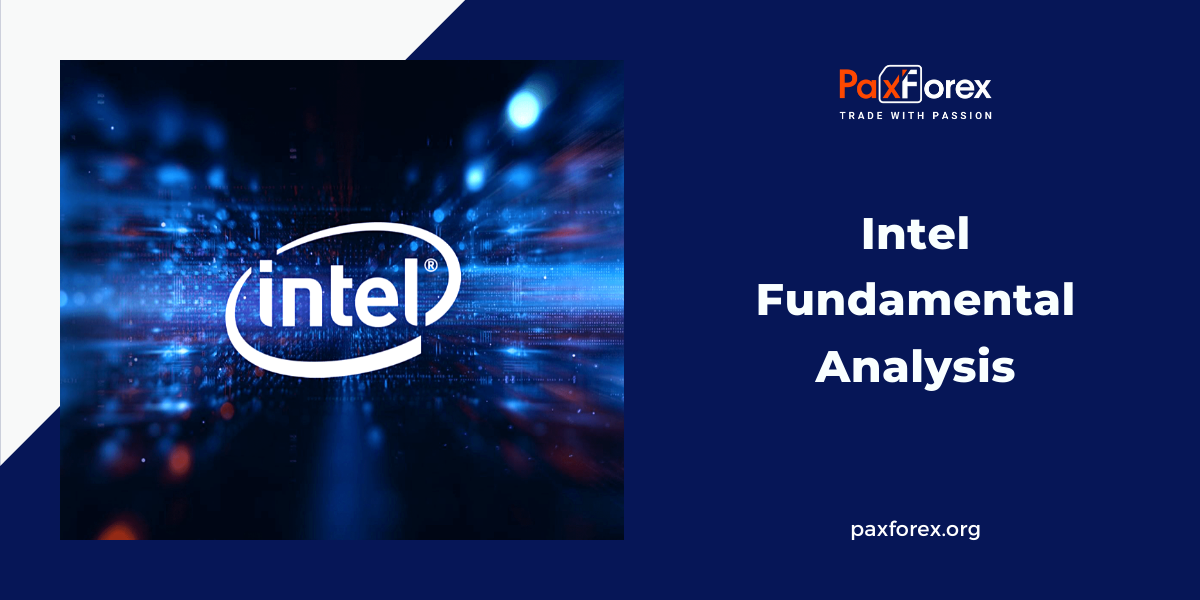
Source: PaxForex Premium Analytics Portal, Fundamental Insight
Intel is currently in the midst of an ambitious turnaround plan, aimed at catching up to competitors in CPU technology, pioneering new AI-related platforms through Gaudi accelerators, and establishing a substantial foundry for third-party chip manufacturing. However, this turnaround venture is expected to require significant financial backing, and Intel's cash flow heavily relies on its core PC CPU business, where it has traditionally held a dominant position.
Despite coming off the worst PC downturn in recent memory following the pandemic-induced surge, Intel is now confronted with three significant challenges simultaneously, which threaten its cash-cow PC business and, consequently, the success of its entire turnaround strategy.
Recently, Reuters reported that both Nvidia and Advanced Micro Devices are discreetly developing a PC processor based on Arm Holdings architecture, designed to run on the Microsoft Windows operating system. These innovative chips from Nvidia and AMD are slated to become available for PCs in 2025.
Microsoft had previously enlisted Qualcomm to create Arm-based chips for Windows back in 2016, with an exclusivity agreement set to expire in 2024. Qualcomm has recently unveiled its new Arm chip for PCs, boasting impressive performance.
Microsoft's response to Apple's success in capturing PC market share with Arm-based M-series chips has spurred a desire for diversification in the PC market. Nvidia and AMD, known for their innovation in chip development, are likely to bring significant disruption and innovation to the PC industry, particularly as manufacturers seek to infuse AI capabilities into PCs and desktops.
Qualcomm, on the other hand, is set to challenge these giants with its Snapdragon X Elite processor for Windows laptops, expected to be available in 2024. This new system-on-chip processor includes Qualcomm's Oryon central processing unit, an Adreno graphics processor, a Hexagon neural (AI) processor, RAM memory, and other components essential for PC operations.
Qualcomm claims its new Snapdragon chip outperforms Intel i9 for gaming and Apple's M2. It also demonstrates prowess in handling artificial intelligence tasks, capable of processing large language models with up to 13 billion parameters.
So, why haven't PCs embraced Arm chips more widely before? The entrenched x86 architecture and software compatibility have historically posed challenges, with developers predominantly creating software for x86 chips. Even previous attempts at Arm-based tablets faced issues due to compatibility glitches. Apple overcame this hurdle with its in-house developed application compatibility software layer called Rosetta 2, which allowed Intel-based software to run on Apple's Arm-based M2 chip.
While Microsoft has the capability and financial resources to provide a similar software translator, it faces the daunting task of ensuring compatibility with Intel software on Qualcomm chips, as well as potential future offerings from AMD and Nvidia. This complexity adds a layer of challenge to the transition.
If these new Arm chips prove successful, even to a moderate extent, it could pose a severe threat to Intel. The company's efforts to regain technological leadership, expand foundries, and catch up with rivals will be seriously compromised. Intel's financial stability heavily relies on the cash flow generated by its well-established PC chip business. With the prospect of its x86 PC chip moat being breached, the company's financial capabilities are at risk of being further strained.
Intel CEO Pat Gelsinger's already formidable turnaround mission has become even more daunting.
As long as the price is above 32.00, follow the recommendations below:
- Time frame: D1
- Recommendation: long position
- Entry point: 32.38
- Take Profit 1: 35.00
- Take Profit 2: 37.00
Alternative scenario:
If the level of 32.00 is broken-down, follow the recommendations below:
- Time frame: D1
- Recommendation: short position
- Entry point: 32.00
- Take Profit 1: 30.00
- Take Profit 2: 28.00













